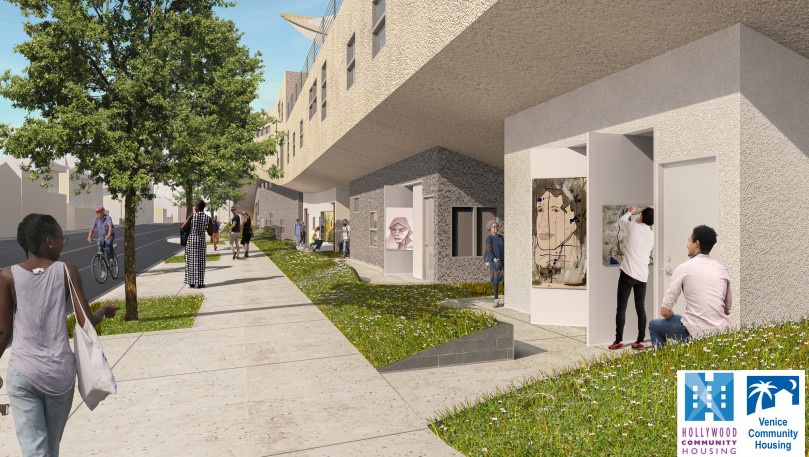At Wednesday’s Housing and Homelessness Committee meeting, Councilmember Traci Park pushed her motion to move affordable housing off Lot 731, the long-approved site of the Venice Dell project, and onto nearby Lot 701. Park framed the change as “finally moving forward” on housing and infrastructure. But residents on the Westside were not convinced. The committee was flooded with emails criticizing her motion as a transparent attempt to derail Venice Dell, a project that has already cleared years of approvals and is closer than ever to construction.
The Venice Dell Community has been in the works since 2017, when the city selected nonprofit developers Venice Community Housing and Hollywood Community Housing Corp. to turn a city-owned parking lot into deeply affordable housing. Since then, the project has been vetted through public hearings, survived multiple lawsuits, and was approved by the City Council in both 2021 and 2022. Last December, after a lengthy hearing, the California Coastal Commission gave its unanimous approval, confirming that the plan accommodates parking, preserves a boat launch, and protects coastal access while delivering 120 units of affordable housing.
In the past two months, Venice Dell has secured nearly $45 million in public funding. That includes allocations from the City’s Affordable Housing Trust Fund and, just last week, an award through the State’s competitive Multifamily Housing Program “super NOFA.” That award is especially significant: it confirms that the state recognizes the project’s site control, and it positions Venice Dell to secure low-income housing tax credits next year, the final step in completing its financing stack. With those credits, the project will be fully funded. It is also structured with a Project Labor Agreement, ensuring hundreds of good union jobs alongside the new homes.
Against this backdrop, Park’s October 1 speech was built on shaky ground. She argued that Lot 731 is unsuitable because it is a FEMA flood zone, adjacent to canals, and central to Venice’s coastal access. Yet these very issues were studied in detail during years of environmental and regulatory review. The Coastal Commission’s approval demonstrates that Venice Dell meets state standards, balancing housing with coastal access and parking.
Park also claimed the Board of Transportation Commissioners’ December 2024 decision declaring Lot 731 “not feasible” for housing was binding. It was not. The City Council retains authority over the use of city land, and courts have already ruled that the board’s recommendation cannot override Council approvals.
Her presentation of Lot 701 as the “only viable site” was equally misleading. Lot 701 was never part of the city’s competitive RFP process, is smaller and more constrained, and would require starting the process over. New feasibility studies, developer selection, environmental review, and Coastal Commission approval would be needed. Far from accelerating housing, moving to Lot 701 would add years of delay while Venice Dell sits ready to break ground.
Park further suggested that Venice Dell would “evict” long-term rent-stabilized tenants. In reality, relocation of the small number of households on the site was already incorporated into the City’s approvals, with legal requirements for assistance and replacement housing. Venice Dell would create a net gain of 120 permanently affordable homes, a far greater benefit to low-income residents than preserving four units of existing RSO housing.
She also leaned heavily on the argument that Venice needs more parking revenue. But Venice Dell’s approved design already includes a structured public garage to replace existing spaces. In the long term, the City would see increased revenue from parking at the new facility. By contrast, abandoning Venice Dell would trigger massive costs. Breaching the development agreement would force the City to pay millions out of its general fund, deepening an ongoing budget crisis. Undoing approvals would also expose Los Angeles to lawsuits under the Housing Accountability Act and fair housing law.
Finally, Park described Venice Dell as “defunct.” This is flatly false. The project is not only alive but thriving. It has secured tens of millions in new funding, holds a valid development agreement, and has every major approval needed to move forward. Calling it “defunct” is rhetoric meant to mask the fact that it is shovel-ready and positioned to start construction within the year.

